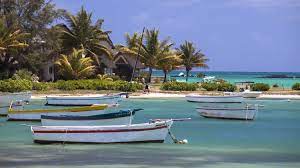Mauritius

Mauritius is the perfect honeymoon destination with its powder sand beaches, crystal clear waters, rows of palm-trees and luxury resorts. But if the island effectively suits newly married couples, it is equally worth the visit for the traveler interested in an Eden-like experience with a cultural and historical bonus. This is where lies Mauritius’ secret. Explore the countless historical sites bearing witness to the rich Dutch, French and English past of the island, walk in the footprints of the emblematic Dodo, taste a delightful cuisine, dance to the addictive rhythm of Sega music… If you ever get tired of sunbathing, there is always something interesting to do in Mauritius!
HEALTH INFORMATION
We make every effort to ensure that the information posted on our website is up to date and accurate according to the latest public health recommendations; however, it is impossible for us to make changes on a daily basis.
For the most current travel health recommendations, please call our clinic as make an appointment with one of our travel health professionals.
MAURITIUS – RECOMMENDED VACCINES
| The Yellow Fever Vaccine | A proof of vaccination against yellow fever may be required upon entry in to this country. Some travellers may not be eligible to receive this vaccine. Please enquire with your health care professional regarding your specific details. It is important to note that the vaccine should be administered at least 10 days prior to your departure. For further information, please consult with the World Health Organization (WHO) website: https://www.who.int/ith/ith- |
| Hepatitis A | Recommended for all travelers. |
| Hepatitis B | Recommended for all travelers. |
| Causes, Symptoms & Treatment – Typhoid fever | Recommended for all travelers. |
| Tetanus – Diphteria – Pertussis Vaccine | Tetanus: In exceptional circumstances (eg, stay in a region where access to health care is limited), for a person aged 18 years or older, 1 dose of DT may be given if 5 years or more has elapsed since the last dose. Otherwise, one booster dose at the age of 50*. Pertussis (Whooping Cough): 1 dose is recommended for pregnant women, for every pregnancy, regardless of immunization history and the interval since the last dose (betwen week 26 and 32). *Only applicable for Quebec. |
| Measles – Rubella – Mumps | Two doses recommended for all travelers born after 1970, if not previously given. |
| Transmission, Symptoms and Prevention – Rabies | For travelers at high risk of animal bites or being involved in activities with bats. Clients who plan to visit remote areas may consider receiving this vaccine. Important to note the pre-exposure rabies vaccine is administered in 2 doses with one week interval between doses. Post-exposure vaccination is always recommended, even for those previously vaccinated. |
| Cholera | For humanitarian workers and health care providers. |
| Flu – Influenza | Seasonal influenza occurs worldwide. The flu season usually runs from November to April in the northern hemisphere, between April and October in the southern hemisphere and year round in the tropics. Influenza (flu) is caused by a virus spread from person to person through coughing and sneezing or by touching infected surfaces. Everyone 6 months and older should get a flu vaccine yearly. Vaccine is recommended 14 days prior to departure. |
| Routine vaccines (dCaT, Polio, Meningococcal, Shingles, Pneumococcal, Hepatitis B, HPV, MMR & Varicella) | Recommended for all travelers |
| Schistosomiasis | Avoid swimming in fresh water. |
| Turista – Traveler’s Diarrhea (ETEC) | Talk to your health care professional about the risks and precautionary measures to take, as well as the Dukoral® vaccine. Important to note that the Dukoral vaccine is an oral vaccine given in 2 doses, recommended at least 2 weeks prior to departure. |
| Dengue Fever, Chikungunya and/or Zika | There are many illnesses that are transmitted via mosquito bites and unfortunately we do not have vaccines to protect us against most of them. It is important to inquire with your healthcare professional regarding the specific risks and the different illnesses presently in circulation. |
RECOMMENDED MEDICATIONS
| Antibiotics Traveler’s Diarrhea | Azithromycin or Suprax |
MEDICAL CARE
Mauritius may be a greatly prized holiday destination, but the medical care provided by the country’s hospitals remains of medium quality. There are not many medical facilities in Mauritius and they often suffer from the lack of adequate medical equipment and medicine shortages. Note that you can access quality medical care in the governmental organization “Service Aide Medicale Urgence (SAMU)” located in Port-Louis, the capital city. You can also subscribe to MegaCare, a private organization. In the event of a serious sickness or medical complications, an air evacuation to another country is required.
In case of emergency in Mauritius, call 114 or 116 (MegaCare ambulances, subscribers only).
Quality medicines may not always be accessible. Be sure to bring your own essential medical kit when traveling to Mauritius.
SECURITY ABROAD
Petty crime, such as pickpocketing, bag snatching and theft, occurs. Pickpockets are active in crowded markets downtown and other high tourist areas in Port Louis.
CANADIAN EMBASSY
Emergency services
In case of emergency, dial:
- police: 999 / 112
- medical assistance: 114
- firefighters: 995 / 115
